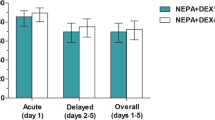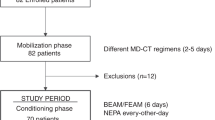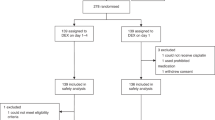Abstract
We have reported previously that the anti-emetic efficacy of single agent 5HT3 antagonists is not maintained when analysed with the measurement of cumulative probabilities. Presently, the most effective anti-emetic regimen is a combination of a 5HT3 antagonist plus dexamethasone. We, therefore, assessed the sustainment of efficacy of such a combination in 125 patients, scheduled to receive cisplatin > or = 70 mg m(-2) either alone or in combination with other cytotoxic drugs. Anti-emetic therapy was initiated with 10 mg of dexamethasone and 3 mg of granisetron intravenously, before cisplatin. On days 1-6, patients received 8 mg of dexamethasone and 1 mg of granisetron twice daily by oral administration. Protection was assessed during all cycles and calculated based on cumulative probability analyses using the method of Kaplan-Meier and a model for transitional probabilities. Irrespective of the type of analysis used, the anti-emetic efficacy of granisetron/dexamethasone decreased over cycles. The initial complete acute emesis protection rate of 66% decreased to 30% according to the method of Kaplan-Meier and to 39% using the model for transitional probabilities. For delayed emesis, the initial complete protection rate of 52% decreased to 21% (Kaplan-Meier) and to 43% (transitional probabilities). In addition, we observed that protection failure in the delayed emesis period adversely influenced the acute emesis protection in the next cycle. We conclude that the anti-emetic efficacy of a 5HT3 antagonist plus dexamethasone is not maintained over multiple cycles of highly emetogenic chemotherapy, and that the acute emesis protection is adversely influenced by protection failure in the delayed emesis phase.
This is a preview of subscription content, access via your institution
Access options
Subscribe to this journal
Receive 24 print issues and online access
$259.00 per year
only $10.79 per issue
Buy this article
- Purchase on Springer Link
- Instant access to full article PDF
Prices may be subject to local taxes which are calculated during checkout
Similar content being viewed by others
Author information
Authors and Affiliations
Rights and permissions
About this article
Cite this article
de Wit, R., van den Berg, H., Burghouts, J. et al. Initial high anti-emetic efficacy of granisetron with dexamethasone is not maintained over repeated cycles. Br J Cancer 77, 1487–1491 (1998). https://doi.org/10.1038/bjc.1998.244
Issue Date:
DOI: https://doi.org/10.1038/bjc.1998.244
This article is cited by
-
Prevalence and predictors of long-delayed (> 120 h) chemotherapy-induced nausea and vomiting (CINV)—a systematic review and individual patient data meta-analysis
Supportive Care in Cancer (2023)
-
Prophylactic aprepitant is better than salvage for carboplatin-based chemotherapy: a propensity score-matched analysis
Medical Oncology (2018)
-
X-ray analysis of the effect of the 5-HT3 receptor antagonist granisetron on gastrointestinal motility in rats repeatedly treated with the antitumoral drug cisplatin
Experimental Brain Research (2014)
-
Palonosetron and prednisolone for the prevention of nausea and emesis during fractionated radiotherapy and 5 cycles of concomitant weekly cisplatin—a phase II study
Supportive Care in Cancer (2013)
-
A phase III open-label study to assess safety and efficacy of palonosetron for preventing chemotherapy-induced nausea and vomiting (CINV) in repeated cycles of emetogenic chemotherapy
Supportive Care in Cancer (2012)



